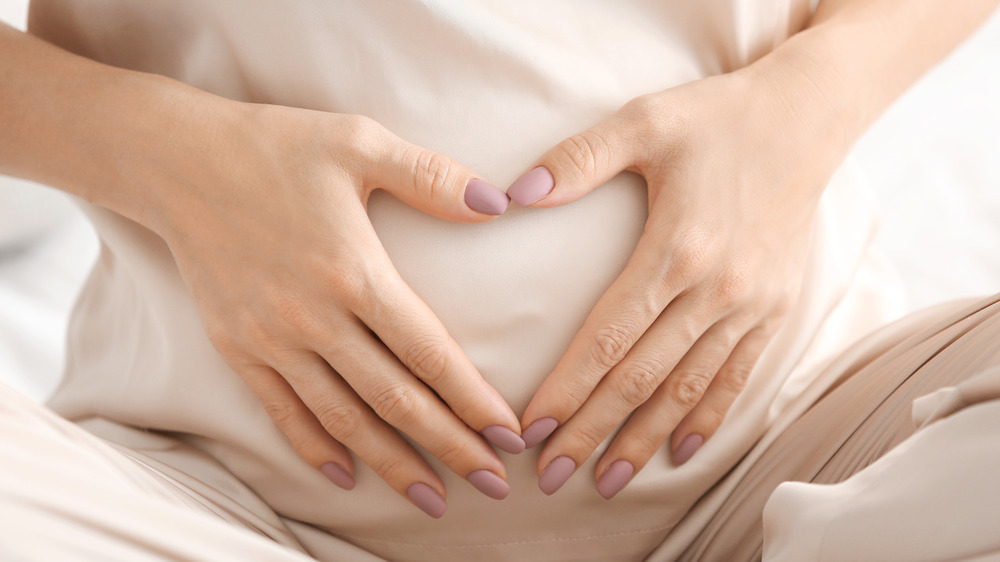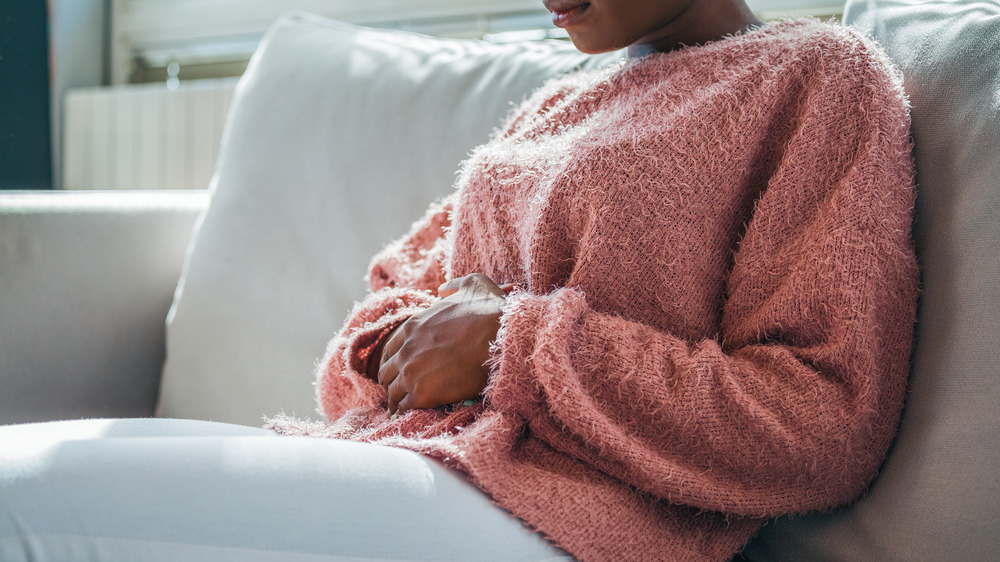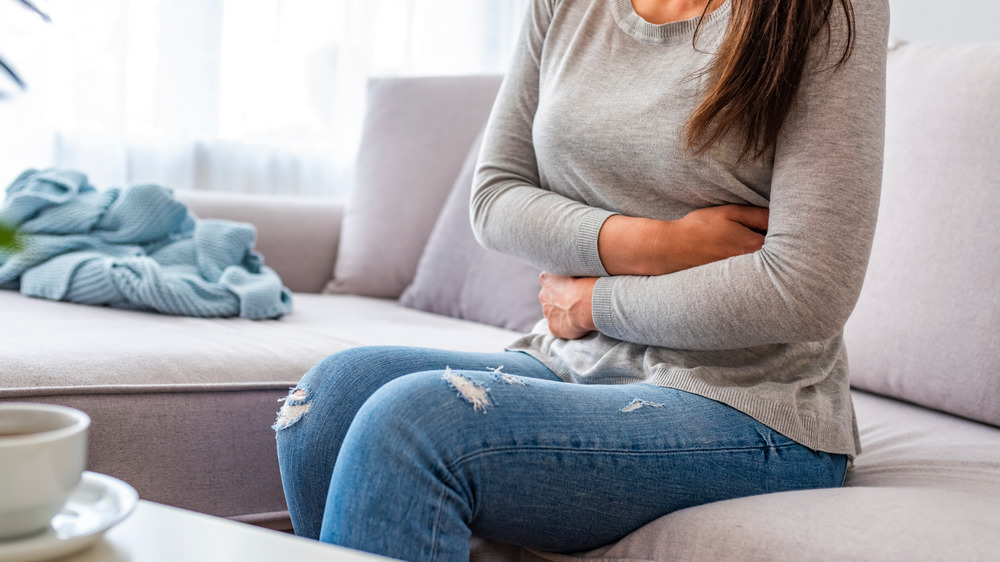Things That Happen To The Female Body That Might Surprise You
It's no secret that women's bodies are beautiful. But there's also a whole lot more to them than what meets the eye. They are nuanced and complicated and work in mysterious ways — ways that have kept women alive and thriving for as long as time. They're self-sufficient, self-regulating, and self-healing. They can bleed for 12 weeks out of the year, create life, push out babies, fight off infections, change in shape, and, overall, are capable of so much. They can even adapt to their environments and to the other women around them. In other words: The female body is quite a miracle. But many people, including women themselves, don't fully understand the extent of depth to the female body.
Curious about the various ways in which women's bodies operate? Here are some of the things that happen to the female body that might surprise you.
If women spend a lot of time together, their periods may sync up
Ever wonder why you and your friends or other women you know tend to experience PMS at the same time? While it may sound like a fluke, some studies support that when women spend a good chunk of time together, their periods can actually sync up. Most women know this as "cycle syncing," but the clinical term for it is the "McClintock effect," according to Healthline. It's named after Martha McClintock, who studied 135 college women living in a dorm. She set out to see whether or not their menstrual cycles would align and, as it turns out, many of them did.
Researchers are still largely undecided about how true this is for all women. One 2006 study published in Human Nature asserts that women do not synchronize. The researchers called cycle syncing a coincidence. But more recent research published in 2017 in the Headache Journal finds that women who live together do tend to share the same menstrual symptoms. Like migraines, for example. This research suggests that women may not only influence the timing of each other's periods, but also the side effects of their periods.
Women's pelvises change during pregnancy
While not all women want to be mothers (and their reasons, or even lack thereof, are all totally valid), their pelvises still continue to grow after the rest of their bones stop. This is according to a study published in the Journal of Orthopaedic Research. That's right: Generally, skeletal growth stops after adolescence, but the pelvis continues to widen. In fact, it widens over 20 millimeters between the ages of 20 and 80. Interestingly, this is true in both men and women.
However, women's pelvises also go through changes during pregnancy. According to another study published in PLOS One, a woman's pelvic alignment changes during the perinatal period, or just before birth. It widens and tilts forward during this time to prep for delivery. And as Healthline explained, "Your pelvic bones will slightly separate from each other, and it's this separation that allows a baby to move through your pelvic joints. But although the ligaments around your pelvis will relax in preparation for childbirth, your pelvis shape doesn't change."
Women shrink more than men
The older you would get during childhood, the taller you would get. Eventually, you'd stop growing — but did you realize that one day, you'd just start reversing? It may not be apparent at first but, before you know it, you're a lot shorter and needing that ladder to reach the spice cabinet. This happens to both men and women, but women seem to shrink more. As Dr. Roshini Raj explained to NBC News, "For men it's less prominent because they have more muscle mass in general and their bones tend to be stronger they lose less height."
As part of a study published in the American Journal of Epidemiology. The researchers looked at over 2,000 men and women aged 17 to 94 years who were all enrolled from 1958 to 1993 in the Baltimore Longitudinal Study of Aging in Baltimore, Maryland. They found that women tended to lose more height over that time period than did men. It all starts at around 30 years old. And you just get shorter and shorter from there.
The vagina's pH can self-regulate and change over time
The vagina is one of the smartest body parts, but it's such a taboo topic that many people don't even know how cool it is. Yup, we said it: Vaginas are cool. Why? First and foremost, they can totally self-regulate, according to Medical News Today. The vagina has a pH balance that measures the vagina's acidity. A pH that sits below 7 is considered acidic, while a pH above 7 is considered to be basic. While anyone with a vagina knows there's no such thing as "normal," a vaginal pH that's considered "normal" is typically below 4.5. It might sit around 3.8 to 4.5, for example.
"A healthy level of vaginal pH for a woman in her reproductive years is 4.0 to 4.5 acidic, and can be higher than 4.5 in women after menopause," Dr. Srijaya Soujanya Nalla, a gynecologist and obstetrician with Banner Health Clinic in Greeley, Colorado, explained to Banner Health.
Contrary to popular belief, the vagina's pH can balance itself out. Typically, soaps and douches are too harsh for the vagina. "It is best to use warm water and a gentle cleanser to clean the vulva but to refrain from using soap inside the vagina," Medical News Today explained.
Mothers can develop maternal instincts
Ever hear of maternal instincts? It's not an old wives' tale. Science actually backs up that mothers can develop maternal instincts. According to maternal brain researcher Pilyoung Kim, pregnant women start experiencing neurological changes before their babies even arrive.
"This is what we call an aspect of almost the obsessive-compulsive behaviors during the very first few months after the baby's arrival," Kim told The Atlantic. "Mothers actually report very high levels of patterns of thinking about things that they cannot control. They're constantly thinking about baby. Is baby healthy? Sick? Full?" She added that several areas of a woman's brain changes when she becomes a mom. These areas involve emotion regulation and empathy. "In animals and humans during the postpartum period, there's an enormous desire to take care of their own child," she explained.
Anthropologist Sarah Blaffer Hrdy also told National Geographic that all female mammals have maternal responses. "But this does not, as is often assumed, mean that every mother who gives birth is automatically [ready] to nurture her offspring," she said. "Rather, gestational hormones prime mothers to respond to stimuli from her infant, and after birth, step by step, she is responding to cues."
This body part swells in response to different situations
You probably could have assumed that the vagina has the ability to change shape. After all, it can push out a child. But the vagina can change its form in different situations — from childbirth to sexual intercourse.
Take childbirth, for starters. When a woman is giving birth, extra blood flows through the vaginal region. This can make the whole area feel swollen or full, Dr. Katie Bolt, an OB-GYN at Partners in Ob/GYN Care at Texas Children's Pavilion for Women, told Parents.
During sex, blood also flows to the vagina. And, as a result, the vagina swells, OB-GYN Leah Millheiser told Women's Health. "Right before a woman orgasms, the upper two-thirds of her vagina actually swell," she said. Theories vary as to why this happen. Some think its to accommodate penis size, others say that the increase in the cervix area is to boost a woman's chances of being impregnated.
Women are more in touch with their intuition
Women are intuitive. Point blank and period. But don't just take our word for it. Experts agree. "Research on nonverbal communication skills has clearly shown that women are, as a group, better at reading facial expressions of emotions than men," writes Dr. Ronald E Riggio for Psychology Today. "As a result, women are more likely to pick up on the subtle emotional messages being sent by others." Riggio also adds that women are generally better at expressing their own emotions through their tone of voice, facial expressions, body language, and more. All of this, combined, makes women exceptionally intuitive.
Of course, this isn't to say men aren't intuitive. "It's not the case that some people are intuitive and some people are analytical," psychologist David Ludden theorized at a talk titled "On Intuition" (via The Cut). "We're all intuitive — it's the basic machinery that we've got." The difference, he explained, is how much women listen to their intuition. So women may seem more intuitive because "girls are told to trust their intuition," while boys are not.
Women typically shed their uterine lining every month
We all know that women, in general, get periods. It's important to note, though, that not all women get their periods, which is a condition called amenorrhea, according to Healthline. This can happen because of natural causes like pregnancy and menopause, or it may be due to an underlying disease, physical defect, genetic disorder, medication, or another other factors.
Even if you have had a period for decades, do you really know what a period is? A period isn't just blood, according to Planned Parenthood. It's actually a combination of blood and tissue from a woman's uterine lining, which then comes out through the vagina. Generally, this happens about once a month for about a week. But all women's bodies are different, and each woman should know what's "normal" for her. Changes to a woman's menstrual cycle may be cause for concern (though it's often just due to factors like diet, stress, medication, et cetera).
Some women can go into menopause early
Menopause is the time in a woman's life when she stops having periods, which is a result of natural hormonal changes in her body, according to Planned Parenthood. Basically, menopause happens when the body stops producing the hormone estrogen, which, in turn, slows down a woman's other reproductive hormones like progesterone. Without these hormones, women can't get their period or get pregnant, according to the Mayo Clinic. Menopause typically happens around the late 40s or early 50s, but it may happen even earlier for some women. This is considered premature menopause.
Whenever menopause hits, the symptoms can range from uncomfortable to debilitating. Sleep problems and night sweats affect many menopausal women, largely because of hot flashes. "There are changes in the brain that lead to the hot flash itself, and those changes — not just the feeling of heat — may also be what triggers the awakening," Dr. Grace Pien, an assistant professor of medicine at the Johns Hopkins Sleep Disorders Center, wrote for Johns Hopkins Medicine. "Even women who don't report sleep disturbances from hot flashes often say that they just have more trouble sleeping than they did before menopause."
A woman's vagina self-lubricates when aroused
The vagina can do a whole lot, including self-lubricate when a woman is aroused. Medical News Today explained that "fluid from the cervix and secretions from the Bartholin glands — two pea sized glands at the entrance to the vagina — help keep the vagina lubricated. During arousal, the Bartholin glands secrete extra fluid to reduce friction." That is, according to the International Society for Sexual Medicine, lubrication readies the vagina for sexual intercourse. And "pain during intercourse is often caused by inadequate lubrication," according to the Society. A growing body of research supports that foreplay can help, and is thus the key to good sex (via Healthline).
But it's important to note that not all women can sufficiently self-lubricate. In fact, many women experience vaginal dryness that may be a result of a number of factors, according to Healthline. These include sexually transmitted diseases, bacterial infections, and hormonal changes.
A woman's vagina discharges fluids that change consistency with her fertility window
If you have a vagina, you've experienced vaginal discharge — that's just how it goes. But did you know that a woman's vaginal discharge fluids change consistency based on her fertility window? That's right. According to Healthline, vaginal discharge begins a few months before a girl's period first starts in adolescence. And it typically tapers off once women hit menopause. But, in the meantime, it flows from the vagina.
So, what is it anyway? Basically fluid and cells. Normally, it's white or clear, but the consistency isn't always the same and can change (as can the color). For example, during ovulation, vaginal discharge may be thicker. This is because the body is releasing an egg from the ovaries, which can change the discharge.
Other factors that can affect the consistency of a woman's discharge include sexually transmitted diseases, bacterial infections like bacterial vaginosis, yeast infections, medications, hormonal imbalances, and more. All women are different, so it's important to know what's "normal" on a personal level.
Some women get "period poops"
Contrary to the saying "girls don't poop," girls — and women — do poop. In fact, many of them poop a lot while they're on their periods. Ever hear of "period poops?" It's a thing. For many women, constipation followed by diarrhea are the worst parts of periods.
"Many women do get bowel changes just before or during their period," Dr. Kyle Staller, a gastroenterologist at Massachusetts General Hospital, told Self. "The reason that this happens is largely due to hormones." Women experience an increase in progesterone just before their periods. This hormone is necessary during ovulation, but it can also slow down food through the intestines. This means one thing: Constipation.
Then, when a woman's period finally comes, prostaglandins (which are like hormones) can cause diarrhea. The cells of the uterine lining produce prostaglandins, which get released when the lining sheds in menstruation. But if the body makes a ton, they can also creep their way into the muscle lining the bowels, causing the intestines to contract just like the uterus. So, like the uterus releases blood, the intestines release fecal matter, Dr. Ashkan Farhadi, a gastroenterologist at MemorialCare Orange Coast Medical Center, told Self.
Women's bodies have "adapted to danger" and respond to fear differently than men
"Anxiety is a psychological, physiological, and behavioral state induced in animals and humans by a threat to well-being or survival, either actual or potential," according to research on fear published in Dialogues in Clinical Neuroscience. "It is characterized by increased arousal, expectancy, autonomic and neuroendocrine activation, and specific behavior patterns. The function of these changes is to facilitate coping with an adverse or unexpected situation."
Although men and women are both capable of feeling and reacting to fear, PACEs Connection explained that "female bodies are adapted to danger." Women also respond differently when scared. According to research by psychology professor Dr. Shelly Taylor, women appear to rely on the tend-and-befriend method as opposed to fight-or-flight. "Taylor found that women demonstrate affiliative, pro-social behavior in response to a threat. In response to stress, women tend (groom, feed, stroke, clean) and befriend (gather, connect)," according to PACEs Connection.
Women's breasts change before menstruation and during arousal
Boobs can change much like the vagina, it's true. This happens when a woman is about to get her period and while she's aroused. According to Mount Sinai, hormone changes are responsible for changes to breast size during the premenstrual period. Women produce more estrogen during this time, which peaks just before the middle of their cycle. And this causes the breast ducts to increase in size. Meanwhile, progesterone levels also rise, peaking at around Day 21 in a 28-day cycle. And this causes the breast lobules (also known as the milk glands) to grow bigger.
During sex, a woman's breasts can also swell. "Women can experience swelling of the breasts due to increased blood flow during intercourse," Dr. Leah Millheiser, OB-GYN, told Women's Health. How swollen they get varies, and the swelling will go down after she's no longer aroused.















